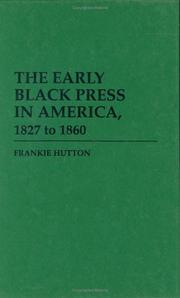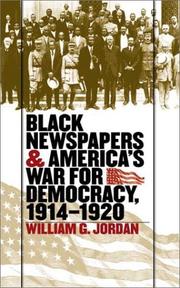| Listing 1 - 10 of 17 | << page >> |
Sort by
|
Book
ISBN: 1496215478 9781496215475 9781496215468 149621546X 9781496215451 1496215451 9780803299924 0803299923 Year: 2019 Publisher: Lincoln
Abstract | Keywords | Export | Availability | Bookmark
 Loading...
Loading...Choose an application
- Reference Manager
- EndNote
- RefWorks (Direct export to RefWorks)
African American newspapers --- African American celebrities --- African American press --- African American journalism --- Afro-American press --- Journalism, African American --- Negro press --- Press, African American --- African American mass media --- Ethnic press --- Celebrities, African American --- Celebrities --- Afro-American newspapers --- Negro newspapers (American) --- American newspapers --- Political aspects --- History --- Press coverage.
Book
ISBN: 0820349399 9780820349398 9780820349404 0820349402 0820349402 0820354694 Year: 2016 Publisher: Athens The University of Georgia Press
Abstract | Keywords | Export | Availability | Bookmark
 Loading...
Loading...Choose an application
- Reference Manager
- EndNote
- RefWorks (Direct export to RefWorks)
Press and politics --- African American newspapers --- African American press --- Politics and the press --- Press --- Advertising, Political --- Government and the press --- Journalism --- Afro-American newspapers --- Negro newspapers (American) --- American newspapers --- African American journalism --- Afro-American press --- Journalism, African American --- Negro press --- Press, African American --- African American mass media --- Ethnic press --- History --- Political aspects
Book
ISBN: 9780252050091 0252050096 9780252041495 9780252083037 0252083032 0252041496 Year: 2017 Publisher: Urbana
Abstract | Keywords | Export | Availability | Bookmark
 Loading...
Loading...Choose an application
- Reference Manager
- EndNote
- RefWorks (Direct export to RefWorks)
"Once distinct, the commercial and alternative black press began to cross over with one another in the 1920s. The porous press culture that emerged shifted the political and economic motivations shaping African American journalism. It also sparked disputes over radical politics that altered news coverage of some of the most momentous events in African American history. Starting in the 1920s, Fred Carroll traces how mainstream journalists incorporated coverage of the alternative press’s supposedly marginal politics of anticolonialism, anticapitalism, and black separatism into their publications. He follows the narrative into the 1950s, when an alternative press reemerged as commercial publishers curbed progressive journalism in the face of Cold War repression. Yet, as Carroll shows, journalists achieved significant editorial independence, and continued to do so as national newspapers modernized into the 1960s. Alternative writers’ politics seeped into commercial papers via journalists who wrote for both presses and through professional friendships that ignored political boundaries."
African American press --- Civil rights movements --- Civil liberation movements --- Liberation movements (Civil rights) --- Protest movements (Civil rights) --- Human rights movements --- African American journalism --- Afro-American press --- Journalism, African American --- Negro press --- Press, African American --- African American mass media --- Ethnic press --- History --- Press coverage
Book
ISBN: 9783030975012 Year: 2022 Publisher: Cham Springer International Publishing :Imprint: Palgrave Macmillan
Abstract | Keywords | Export | Availability | Bookmark
 Loading...
Loading...Choose an application
- Reference Manager
- EndNote
- RefWorks (Direct export to RefWorks)
African American press. --- African American journalism --- Afro-American press --- Journalism, African American --- Negro press --- Press, African American --- African American mass media --- Ethnic press --- Journalism --- African American universities and colleges --- Study and teaching (Higher) --- Accreditation --- Accreditation. --- Writing (Authorship) --- Literature --- Publicity --- Fake news
Book
ISBN: 1498566855 1498566871 1498566863 9781498566865 9781498566858 Year: 2018 Publisher: Lanham
Abstract | Keywords | Export | Availability | Bookmark
 Loading...
Loading...Choose an application
- Reference Manager
- EndNote
- RefWorks (Direct export to RefWorks)
African American press --- Tea Party movement --- History. --- Press coverage. --- United States --- Politics and government. --- Tea Baggers movement --- Teabaggers movement --- Populism --- Protest movements --- African American journalism --- Afro-American press --- Journalism, African American --- Negro press --- Press, African American --- African American mass media --- Ethnic press
Book
ISBN: 0520971795 9780520971790 9780520300354 0520300351 Year: 2020 Publisher: Oakland, California
Abstract | Keywords | Export | Availability | Bookmark
 Loading...
Loading...Choose an application
- Reference Manager
- EndNote
- RefWorks (Direct export to RefWorks)
Since its founding in 1947, the legendary Magnum Photos agency has been telling its own story about photographers who were witnesses to history and artists on the hunt for decisive moments. Based on unprecedented archival research, The Decisive Network unravels Magnum’s mythologies to offer a new history of what it meant to shoot, edit, and sell news images after World War II. Nadya Bair shows that between the 1940s and 1960s, Magnum expanded the human-interest story to global dimensions while bringing the aesthetic of news pictures into new markets. Working with a vast range of editorial and corporate clients, Magnum made photojournalism integral to postwar visual culture. But its photographers could not have done this alone. By unpacking the collaborative nature of photojournalism, this book shows how picture editors, sales agents, spouses, and publishers helped Magnum photographers succeed in their assignments and achieve fame. Bair concludes in the late 1960s and early 1970s, when changing market conditions led Magnum to consolidate its brand. In that moment, Magnum’s photojournalists became artists and their assignments oeuvres. Bridging art history, media studies, cultural history, and the history of communication, The Decisive Network transforms our understanding of the photographic profession and the global circulation of images in the predigital world.
Documentary photography. --- Photography. --- Magnum Photos. --- 20th century american culture. --- 20th century american journalism. --- art history. --- cultural history. --- cultural studies. --- global. --- history of communication. --- human interest stories. --- journalism. --- life magazine. --- magnum photos. --- market conditions. --- media studies. --- new markets. --- new york city. --- news. --- newspapers. --- photo agency. --- photographers. --- photography journalism. --- photography. --- photojournalism. --- picture editors. --- postwar visual culture. --- sales agents. --- spouses.

ISBN: 0313286965 Year: 1992 Publisher: Westport (Conn.) Greenwood
Abstract | Keywords | Export | Availability | Bookmark
 Loading...
Loading...Choose an application
- Reference Manager
- EndNote
- RefWorks (Direct export to RefWorks)
070 <09> <73> --- 655.4 <73> --- 930 <=96> <73> --- African American newspapers --- -African American press --- -070 <09> <73> Persgeschiedenis--Verenigde Staten van Amerika. VSA. USA --- Persgeschiedenis--Verenigde Staten van Amerika. VSA. USA --- 930 <=96> <73> Geschiedenis van de Negers of Zwarten--(algemeen)--Verenigde Staten van Amerika. VSA. USA --- Geschiedenis van de Negers of Zwarten--(algemeen)--Verenigde Staten van Amerika. VSA. USA --- African American journalism --- Afro-American press --- Journalism, African American --- Negro press --- Press, African American --- African American mass media --- Ethnic press --- Afro-American newspapers --- Negro newspapers (American) --- African American press --- American newspapers --- Uitgeverij. Boekhandel--algemeen--Verenigde Staten van Amerika. VSA. USA --- History --- -History --- -070 <09> <73> --- -African American journalism --- 070 <09> <73> Persgeschiedenis--Verenigde Staten van Amerika. VSA. USA --- -African American newspapers --- 19th century

ISBN: 0813801850 9780813801858 Year: 1972
Abstract | Keywords | Export | Availability | Bookmark
 Loading...
Loading...Choose an application
- Reference Manager
- EndNote
- RefWorks (Direct export to RefWorks)
African American press. --- African American press --- African American newspapers --- African American journalists --- #SBIB:309H1813 --- African American journalism --- Afro-American press --- Journalism, African American --- Negro press --- Press, African American --- African American mass media --- Ethnic press --- Geschiedenis en/of organisatie van het perswezen: algemeen en per land (met inbegrip van de rol van het perswezen in de ontwikkelingsproblematiek) --- 070 --- 070 Pers. Nieuwsbladen. Magazines. Redaktie. Journalistiek--(algemeen) --- Pers. Nieuwsbladen. Magazines. Redaktie. Journalistiek--(algemeen) --- History --- Biography --- United States --- Race relations --- 19th century --- African Americans
Book
ISBN: 0826272592 9780826272591 9780826219398 082621939X Year: 2011 Publisher: Columbia [Mo.] London University of Missouri Press
Abstract | Keywords | Export | Availability | Bookmark
 Loading...
Loading...Choose an application
- Reference Manager
- EndNote
- RefWorks (Direct export to RefWorks)
During the Vietnam War, young African Americans fought to protect the freedoms of Southeast Asians and died in disproportionate numbers compared to their white counterparts. Despite their sacrifices, black Americans were unable to secure equal rights at home, and because the importance of the war overshadowed the civil rights movement in the minds of politicians and the public, it seemed that further progress might never come. For many African Americans, the bloodshed, loss, and disappointment of war became just another chapter in the history of the civil rights movement. Lawrence Allen Eldridge explores this two-front war, showing how the African American press grappled with the Vietnam War and its impact on the struggle for civil rights. This book is the first to examine coverage of the Vietnam War by black news publications, from the Gulf of Tonkin incident in August 1964 to the final withdrawal of American ground forces in the spring of 1973 and the fall of Saigon in the spring of 1975. Eldridge reveals how the black press not only reported the war but also weighed its significance in the context of the civil rights movement. In analyzing seventeen African American newspapers, the author examines not only the role of reporters during the war, but also those of editors, commentators, and cartoonists. Especially enlightening is the research drawn from extensive oral histories by prominent journalist Ethel Payne, the first African American woman to receive the title of war correspondent. She described a widespread practice in black papers of reworking material from major white papers without providing proper credit, as the demand for news swamped the small budgets and limited staffs of African American papers. The author analyzes both the strengths of the black print media and the weaknesses in their coverage. He augmented this study with a rich array of primary sources--including interviews with black journalists and editors, oral history collections, the personal papers of key figures in the black press, and government documents, including those from the presidential libraries of Lyndon Johnson, Richard Nixon, and Gerald Ford--to trace the ups and downs of U.S. domestic and wartime policy especially as it related to the impact of the war on civil rights. The black press ultimately viewed the Vietnam War through the lens of African American experience, blaming the war for crippling LBJ's Great Society and the War on Poverty. Despite its waning hopes for an improved life, the black press soldiered on.
Vietnam War, 1961-1975 --- Civil rights movements --- African Americans --- African American press --- Vietnam Conflict, 1961-1975 --- Vietnamese Conflict, 1961-1975 --- Vietnamese War, 1961-1975 --- African American journalism --- Afro-American press --- Journalism, African American --- Negro press --- Press, African American --- African American mass media --- Ethnic press --- Public opinion. --- History --- Civil rights --- African Americans. --- Press coverage --- Geschichte 1955-1975. --- United States --- Race relations --- Armed Forces --- Afro-Americans --- Negroes

ISBN: 080787552X 9780807875520 9780807826225 0807826227 9780807849361 0807849367 9798890867872 Year: 2001 Publisher: Chapel Hill
Abstract | Keywords | Export | Availability | Bookmark
 Loading...
Loading...Choose an application
- Reference Manager
- EndNote
- RefWorks (Direct export to RefWorks)
Explains how the black press enlisted public support for racial justice during World War I. A delicate balance was achieved between affirming patriotism and supporting President Wilson's war for democracy and demanding the government take steps to stop lynching, segregation and disenfranchisement.
African American press --- African American newspapers --- World War, 1914-1918 --- Afro-American newspapers --- Negro newspapers (American) --- American newspapers --- African American journalism --- Afro-American press --- Journalism, African American --- Negro press --- Press, African American --- African American mass media --- Ethnic press --- European War, 1914-1918 --- First World War, 1914-1918 --- Great War, 1914-1918 --- World War 1, 1914-1918 --- World War I, 1914-1918 --- World War One, 1914-1918 --- WW I (World War, 1914-1918) --- WWI (World War, 1914-1918) --- History, Modern --- History --- Press coverage
| Listing 1 - 10 of 17 | << page >> |
Sort by
|

 Search
Search Feedback
Feedback About UniCat
About UniCat  Help
Help News
News